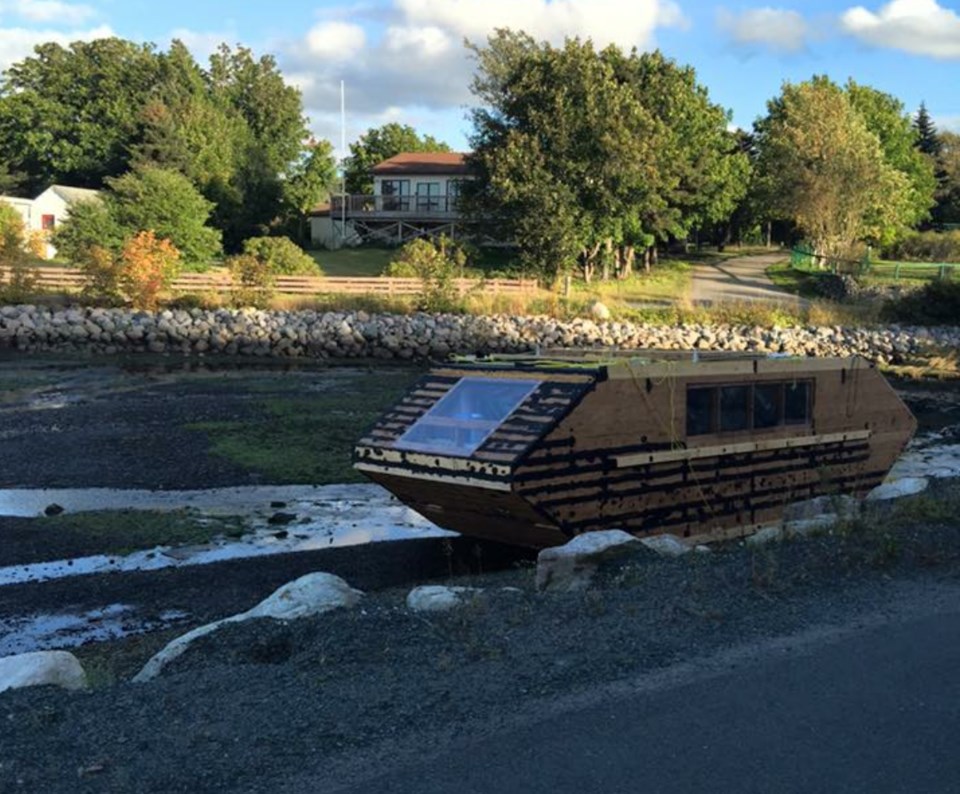THUNDER BAY - A houseboat built by a former Thunder Bay resident found washed-up on the coast of Ireland is puzzling a Conception Bay resident, who saw the boat in Newfoundland more than a year ago.
Early Monday morning, the Ballyglass Coast Guard unit in County Mayo was called about a strange craft near Cross Beach. It was determined that the houseboat was built by Rick Small, an environmentalist from Thunder Bay who made headlines when he travelled across Canada on a solar-powered bike in 2015.
Timothy John Ewart, of Conception Bay, Newfoundland, said he was shocked when he saw images of the boat circulating in the media. Ewart first saw the craft, and Rick Small, in Sept. 2015 in Conception Bay.
“The boat was beached there by my road,” Ewart recalled. “I do a lot of sailing myself and I thought: I got to talk to this guy, because I’ve never seen anything like it.”
Ewart said the boat looked like a camper and was equipped with solar panels and two electric motors. It appeared habitable and Ewart believes that Small was living on the boat.
“It was his home,” he said. “It looked like something that he could stay in for a while.”
During his conversation with Small, Ewart said Small made comments on the number of gas burning engines.
“I asked him what his plan was,” Ewart said. “He said he wanted to take it across the Atlantic, he wanted to prove that solar power can do it.”
In 2015, Small travelled from Thunder Bay to Victoria, B.C. on a solar-powered bike. He made the 7,000 kilometer journey across the country a second time and ended up in St. John’s Newfoundland where he started construction on the houseboat.
“He was quite proud of it,” Ewart said. “You could tell that he put his knowledge into it. But when you have an idea in your head, sometimes it doesn’t always come to fruition, especially when you’re dealing with something like the North Atlantic because it’s not something you can control.”
Ewart himself is an avid sailor and has completed five transatlantic voyages. Based on what he saw of Small’s boat last year, he did not believe it could successfully make the voyage in one piece.
“If the right wind pushed it out into the ocean at the right time, you never know what can happen, right?” Ewart said. “Bottles make it across the ocean. People find bottles. Am I surprised that it showed up in the condition that it did? No. It was missing sections of it and I’m pretty sure that it was waterlogged.”
It is still not clear how the boat made it to the Irish Coast. It was last seen in Newfoundland in late Sept. in Portugal Cove St. Philip’s. A note was found written on the ceiling of the boat that reads: “I, Rick Small, donate this structure to a homeless youth to give them a better life that Newfoundlanders choose not to do! No rent, no mortgage, no hydro.”
Small could not be reached for comment on his boat.
Ewart was surprised to see two kettles still in the boat in photos released by the Irish Coast Guard. He recognized the kettles from photos of Small’s cross-Canada solar powered journey by bike.
“You got to give him credit, because if she did roll or flip over, then those kettles wouldn’t be there anymore,” Ewart said. “I’m generally surprised that it made and that it made it in most of its pieces.”
